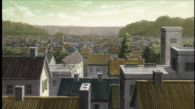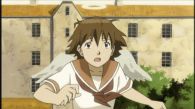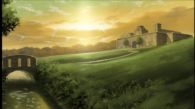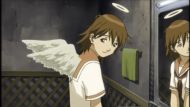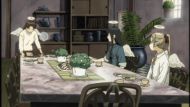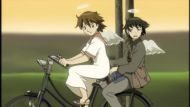

Quick Links:
Haibane Renmei soundtrack HANENONE
Just like the show itself, the Haibane Renmei soundtrack is mostly low key and understated, with a lot of emotional power resting under the surface. I must admit that even though I had seen the show and should have known what to expect, I was caught off guard when I first listened to this album -- so much so that I didn't even like it, just because it didn't align with my (incorrect) expectations. Part of what gives the music its understated quality, and something that is a departure from many anime soundtracks, is that there are no electronic instruments at all. Everything is acoustic, with strings and woodwinds predominating, with the occasional percussion instrument, and even the odd accordion or harmonica tossed in for good measure.
Once I overcame my initial surprise at the mellowness of the music and gave the album a chance, the Haibane Renmei soundtrack really grew on me. The excellent artistry in the music is immediately apparent in the first two tracks, which use a relative sparsity of sounds, but yet sound full and complete in a way that heavy tracks with a full backing band that try to overpower you with sound just can't match. Everything fits together so well here that I can't even point out areas in songs that are missing an expected sound or rhythm. The music just feels right.
Stylistically, the music has to be generally characterized as "orchestral" in nature, even though there seems to be a small number of musicians at any one time. For example, the track "Breath of a Germ" is performed by what seems to be a traditional string quartet (two violins, viola, and cello). In fact, most of the tracks seem to be performed by a string quartet plus a few other instruments as the composer felt relevant to the specific piece. Though the overall sound has a Celtic/Medieval theme, the music takes influences from a variety of sources. "A Little Plate's Rondo" has a strong Medieval-European feel, for example, while "Toga" has a distinct Chinese sound. The music does not remain solidly in any one realm for too long, though, gently moving from influence to influence throughout the album.
This should not be taken to mean that there is no consistency to the album, however. Consistency is found in the overall musical vision of the composer, Kou Otani (the spelling of the composer's name being my own take on things, as the liner notes spell it different ways in different places...), and the consistent appearance of strings and piano across the tracks. Another form of consistency is the general trend to move from a more melancholy, pensive track into a more positive sounding track, and then back to a melancholy track, and then on to something a little peppier, etc. This doesn't always hold true in every case, but that is the general progression.
One potential downside to the music on this album is that it is in general somewhat understated and even downright quiet at times. This means that to get the most out of the album one must actively listen to it, a skill set that some people have simply not developed. If you can devote some effort, though, you will find that this album rewards the listener to the degree that the effort is made to really listen to all that is going on in the music. This also means that this is maybe not a good album to listen to in your car while dragging yourself into work in the morning. If treated as simply background music, the music will often be overcome by background noise, and you will probably not be satisfied by the experience.
I should also note that there are two songs on the album that include vocals, both sung in English. "Wondering" has the same general feel as the rest of the album (vaguely Celtic/Medieval), but "Love Will Light the Way" breaks the mold by being a lounge jazz song, with piano, drums, and upright bass. Both songs are good in their own way, though "Love Will Light the Way" delves a little too much into improvisation near the end for my taste. You would be forgiven for thinking that a jazz song wouldn't fit on an album like this, but amazingly enough it seems to fit just fine, once again because it is aligned well with the overall musical "feel" that the composer is able to imbue into all of the music.
On the downside, this album breaks one of the first rules of anime soundtracks, by not including both the opening and ending theme. "Free Bird," the excellent opening theme, is present in all its glory, but "Blue Flow," the ending theme, is strangely absent. This actually didn't bother me, as I never liked "Blue Flow," but one would still expect the song to be present. (A TV-edit of the song does appear on the Japanese release, after all.) The only other negative thing I can say about the album is that a couple of the tracks, while providing excellent background music to certain important scenes in the show, do not actually work all that well as stand-alone pieces of music. There are tracks like that in just about every soundtrack, though, so I can't really hold that against this album.
Lastly, let's talk liner notes. If you like the artwork of Yoshitoshi Abe (the show's character designer and creative visionary), you will find some nice pieces here, mainly of Rakka and Reki, which makes total sense if you've seen the show. The liner notes also include a short interview with the composer, which explains little and manages to spell some words wrong. Ah, well, I've seen worse in other Pioneer recordings. We also get the lyrics to both vocal tracks.
And there you have it. Hanenone is an excellent album that, while not perfect, comes closer to perfection than you would expect, and deserves a place in every music lover's library, whether they like anime or not. Now there's something you can't say about every anime soundtrack.

